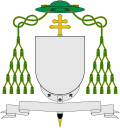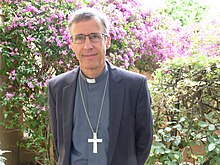Primate of the Gauls: Difference between revisions
The Sr Guy (talk | contribs) No edit summary |
Infobox |
||
| (24 intermediate revisions by 11 users not shown) | |||
| Line 1: | Line 1: | ||
{{Short description|Ecclestiastical rank among French bishops}} |
|||
| ⚫ | |||
{{Infobox official post |
|||
| ⚫ | |||
|post = Primate of the Gauls |
|||
|native_name = Primat des Gaules |
|||
|insignia = Template-Patriarch (Latin Rite) Interwoven with gold.svg |
|||
|image = Évêque d'Ajaccio 2020.jpg |
|||
|incumbent = [[Olivier de Germay]] |
|||
|incumbentsince = 20 december 2020 |
|||
|appointer = [[The Pope]] |
|||
|termlength = At the Pope's pleasure |
|||
|style = |
|||
|formation = {{start date and age|df=y|1079}} |
|||
|first = Gébuin |
|||
|residence = [[Roman Catholic Archdiocese of Lyon|Archdiocese of Lyon]] |
|||
|website = http://lyon.catholique.fr/ |
|||
}} |
|||
| ⚫ | |||
| ⚫ | '''Primate of the Gauls''' is a title given since 1079 to the [[archbishop of Lyon]], former capital of the [[Roman Gaul#Geographical divisions|Three Gauls]] then land of the [[Roman Empire]], and has described the authority he has exercised in the past over the other bishops of France. The primacy of a title conferred on archbishop guarantees a theoretical jurisdiction over several ecclesiastical provinces. In France, only the title of [[Primate (bishop)|Primate]] of the [[Gaul]]s and [[Primate of Normandy]], respectively assigned to the archbishops of Lyon and Rouen, are still used (although the honorific title of Primate of Lorraine brought by the [[bishop of Nancy and Toul]] does exist). |
||
Currently, the primate of the Gauls is Archbishop [[Olivier de Germay]]. |
|||
The current Primate of the Gauls is Cardinal Philippe Barbarin.<ref>http://lyon.catholique.fr/</ref> |
|||
==History== |
==History== |
||
The first Christian missionary work in what is today France was centered on [[Lyon]]. A wave of persecution in [[Asia Minor]] had seen migration of Christians to the cities of [[Lugdunum]] ([[Lyon]]), and [[Vienne]].<ref>[http://www.bartleby.com/210/6/021.html Butler, Alban. "St. Pothinus, Bishop, Sanctus, Attalus, Blandina, &c., Martyrs of Lyons", ''Lives of the Saints'', Vol.VI, 1866]</ref> It was here the first bishops were established there. The [[Bishop of Lugdunum]], [[Saint Pothinus]] (c.177) and his disciple [[ |
The first Christian missionary work in what is today France was centered on [[Lyon]]. A wave of persecution in [[Asia Minor]] had seen migration of Christians to the cities of [[Lugdunum]] ([[Lyon]]), and [[Vienne, Isère|Vienne]].<ref>[http://www.bartleby.com/210/6/021.html Butler, Alban. "St. Pothinus, Bishop, Sanctus, Attalus, Blandina, &c., Martyrs of Lyons", ''Lives of the Saints'', Vol.VI, 1866]</ref> It was here the first bishops were established there. The [[Bishop of Lugdunum]], [[Saint Pothinus]] (c.177) and his disciple [[Saint Irenaeus]] who succeeded him were at the center of this immigration. |
||
Irenaeus had been a student of [[Polycarp]] the disciple of [[John the Evangelist]], and was a skilled [[theologian]] in his own right. Similarly it is probable that [[Pothinus of Lyon]] had known Polycarp, who no doubt sent the immigrants out in the first place<ref>Pothinus may also have known John in his youth.</ref> The [[bishop of Lugdunum]] with such close ties to the disciples, a strong theological reputation and the fact that it was the oldest [[bishopric]] naturally assumed primacy in the expanding Church of Gaul. The first two bishops were known as primate of the Gauls. Thereafter the title lapsed for some centuries although the archbishops did exert some inter diocesan authority. |
|||
In 875, the |
In 875, the primate of the Gauls function was attached to the person of the [[archbishop of Sens]] (at the time of Anségise) by [[Pope John VIII]] at the [[Council of Ponthion]]. This proposal, more political than canonical, was supported covertly by [[Charles the Bald]], who would thus justify its political pretensions throughout the [[Carolingian Empire]]. The [[Archbishop of Reims]], Hincmar, firmly opposed this based on [[canon law]], and the Pope's proposal was not recognized, except by the [[Archbishop of Bordeaux]], Frotaire, for personal interests.<ref>Louis Lacger, « La primatie d'Aquitaine du VIIIe au XIVe siècle », ''Revue d'histoire de l'Église de France'', vol. 23, no 98, 1937, p. 34</ref> |
||
[[Pope Gregory VII |
[[Pope Gregory VII]] confirmed the primacy of the [[bishop of Lyon]] through a [[papal bull|bull]] on April 19, 1079, after a dispute in [[Council of Poitiers]] of 1078. He writes that the Church of Lyons had enjoyed this privilege "per annorum longa curriccula". His intent was to reduce the power of the [[Archbishop of Sens]], but the pope also limits the powers of the tital itself, the holder is not a court of appeal, and he no longer holds the apostolic vicariate.<ref>Gadille Jacques (dir.), Le diocèse de Lyon. ''Histoire des diocèses de France'', Tome 16, Beauchesne, 1983, Paris, p63.</ref> |
||
The primacy of Lyon is challenged regularly, and at the [[Council of Clermont]] of 1 December 1095, [[Pope Urban II]] again confirms the privileges of Lyon and declares that the Archbishop of Sens had to be in submission and obedience to the [[primate (bishop)|primate]]. It was only in 1516 that this dispute ended. |
The primacy of Lyon is challenged regularly, and at the [[Council of Clermont]] of 1 December 1095, [[Pope Urban II]] again confirms the privileges of Lyon and declares that the Archbishop of Sens had to be in submission and obedience to the [[primate (bishop)|primate]]. It was only in 1516 that this dispute ended. |
||
In 1696, the primacy of Gaul |
In 1696, the primacy of Gaul was disputed by the [[primate of Normandy]]. A lawsuit by the [[archbishop of Rouen]], primate of Normandy, sought to reassert Normandy's supremacy and independence, after interference in Rouen by the primate of the Gauls. Completed in 1702, the trial before the court of the Kingdom of France eventually saw triumph the archbishop of Rouen, despite the legitimacy proven and demonstrated the primacy of Gaul and simply default possession. This curiosity made history as the primate of Normandy found himself the equal of the primate of the Gauls, the first being its sole jurisdiction over ecclesiastical province, the second the rest of France.<ref>''Histoire de l'Église de Lyon'', par Étienne-Joseph Poullin de Lumina, 1770, chap. III, p. 414-463, Procès pour la primatie avec l'archevêque de Rouen.</ref> |
||
The current Primate of the Gauls is [[Cardinal (Catholic Church)|Cardinal]] [[Philippe Barbarin]]. |
|||
==References== |
==References== |
||
Latest revision as of 12:57, 11 September 2024
| Primate of the Gauls | |
|---|---|
| Primat des Gaules | |
 | |
since 20 december 2020 | |
| Residence | Archdiocese of Lyon |
| Appointer | The Pope |
| Term length | At the Pope's pleasure |
| Formation | 1079 |
| First holder | Gébuin |
| Website | http://lyon.catholique.fr/ |

Primate of the Gauls is a title given since 1079 to the archbishop of Lyon, former capital of the Three Gauls then land of the Roman Empire, and has described the authority he has exercised in the past over the other bishops of France. The primacy of a title conferred on archbishop guarantees a theoretical jurisdiction over several ecclesiastical provinces. In France, only the title of Primate of the Gauls and Primate of Normandy, respectively assigned to the archbishops of Lyon and Rouen, are still used (although the honorific title of Primate of Lorraine brought by the bishop of Nancy and Toul does exist).
Currently, the primate of the Gauls is Archbishop Olivier de Germay.
History
[edit]The first Christian missionary work in what is today France was centered on Lyon. A wave of persecution in Asia Minor had seen migration of Christians to the cities of Lugdunum (Lyon), and Vienne.[1] It was here the first bishops were established there. The Bishop of Lugdunum, Saint Pothinus (c.177) and his disciple Saint Irenaeus who succeeded him were at the center of this immigration.
Irenaeus had been a student of Polycarp the disciple of John the Evangelist, and was a skilled theologian in his own right. Similarly it is probable that Pothinus of Lyon had known Polycarp, who no doubt sent the immigrants out in the first place[2] The bishop of Lugdunum with such close ties to the disciples, a strong theological reputation and the fact that it was the oldest bishopric naturally assumed primacy in the expanding Church of Gaul. The first two bishops were known as primate of the Gauls. Thereafter the title lapsed for some centuries although the archbishops did exert some inter diocesan authority.
In 875, the primate of the Gauls function was attached to the person of the archbishop of Sens (at the time of Anségise) by Pope John VIII at the Council of Ponthion. This proposal, more political than canonical, was supported covertly by Charles the Bald, who would thus justify its political pretensions throughout the Carolingian Empire. The Archbishop of Reims, Hincmar, firmly opposed this based on canon law, and the Pope's proposal was not recognized, except by the Archbishop of Bordeaux, Frotaire, for personal interests.[3]
Pope Gregory VII confirmed the primacy of the bishop of Lyon through a bull on April 19, 1079, after a dispute in Council of Poitiers of 1078. He writes that the Church of Lyons had enjoyed this privilege "per annorum longa curriccula". His intent was to reduce the power of the Archbishop of Sens, but the pope also limits the powers of the tital itself, the holder is not a court of appeal, and he no longer holds the apostolic vicariate.[4]
The primacy of Lyon is challenged regularly, and at the Council of Clermont of 1 December 1095, Pope Urban II again confirms the privileges of Lyon and declares that the Archbishop of Sens had to be in submission and obedience to the primate. It was only in 1516 that this dispute ended.
In 1696, the primacy of Gaul was disputed by the primate of Normandy. A lawsuit by the archbishop of Rouen, primate of Normandy, sought to reassert Normandy's supremacy and independence, after interference in Rouen by the primate of the Gauls. Completed in 1702, the trial before the court of the Kingdom of France eventually saw triumph the archbishop of Rouen, despite the legitimacy proven and demonstrated the primacy of Gaul and simply default possession. This curiosity made history as the primate of Normandy found himself the equal of the primate of the Gauls, the first being its sole jurisdiction over ecclesiastical province, the second the rest of France.[5]
References
[edit]- ^ Butler, Alban. "St. Pothinus, Bishop, Sanctus, Attalus, Blandina, &c., Martyrs of Lyons", Lives of the Saints, Vol.VI, 1866
- ^ Pothinus may also have known John in his youth.
- ^ Louis Lacger, « La primatie d'Aquitaine du VIIIe au XIVe siècle », Revue d'histoire de l'Église de France, vol. 23, no 98, 1937, p. 34
- ^ Gadille Jacques (dir.), Le diocèse de Lyon. Histoire des diocèses de France, Tome 16, Beauchesne, 1983, Paris, p63.
- ^ Histoire de l'Église de Lyon, par Étienne-Joseph Poullin de Lumina, 1770, chap. III, p. 414-463, Procès pour la primatie avec l'archevêque de Rouen.

